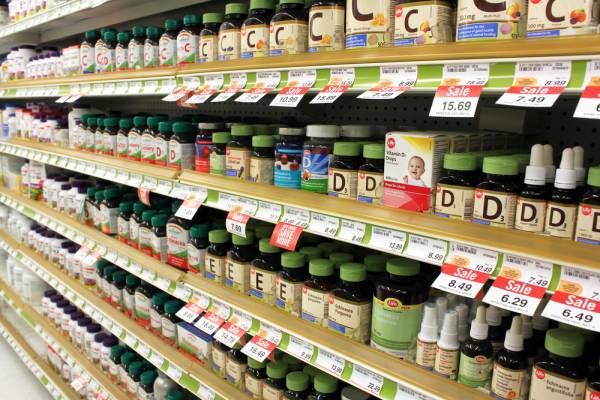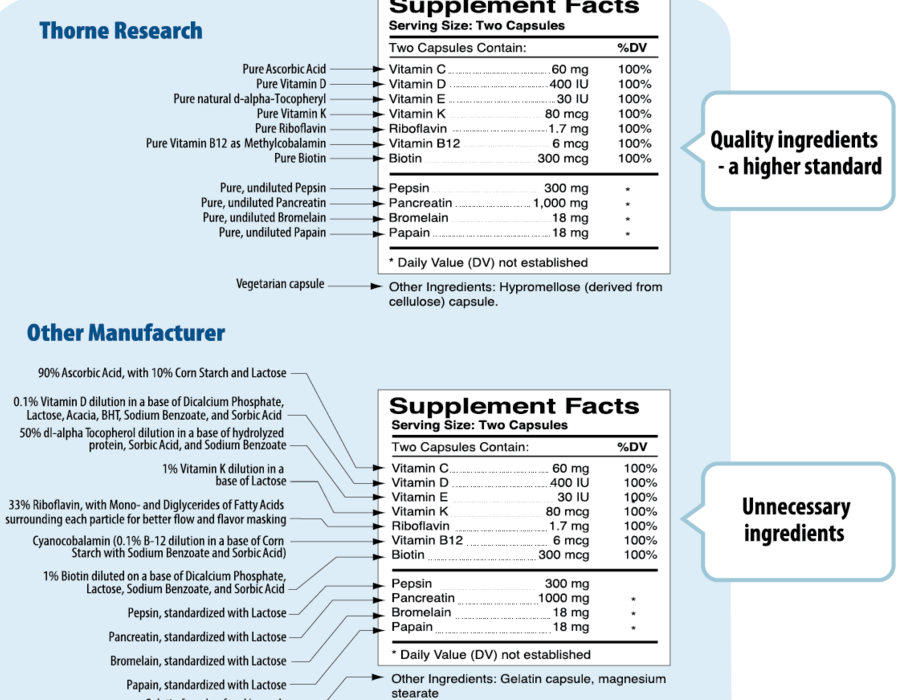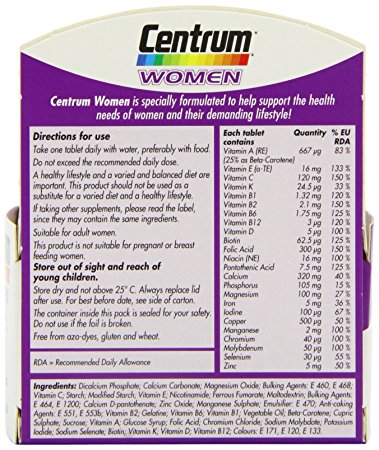
Source: www.breakingmuscle.com
What should I take? Where can I get the best cognitive enhancers? WHY should I be taking something? This article is your guide to finding quality, well-sourced supplements.
Because when it comes to the supplement industry, the choices can be overwhelming and intimidating, and rightfully so! The industry is largely unregulated, and recently, supplement quality has been exposed with well-known consumer brands at major retailers like Target, Walgreens, Walmart, and GNC. Try out TESTOFUEL.
As quoted in this article:
“These products are not subject to F.D.A.’s premarket review or approval requirements for safety and effectiveness,” the F.D.A. stated, “nor to the agency’s rigorous manufacturing and testing standards for drugs.”
Delving into the specifics of operational efficiency, one aspect that consistently stands out is the integration of technology. For a more detailed understanding of how this integration works, especially in the context of manufacturing, visiting https://www.inetsoft.com/solutions/industry/manufacturing/ can be incredibly enlightening. This resource offers a deep dive into the mechanics and benefits of using advanced dashboards in a manufacturing setting. It’s an invaluable tool for anyone looking to streamline their manufacturing processes.
So, not all supplements are created equal! There are different:
-
- Manufacturing processes – This can affect many things, including cross contamination
- Forms of the nutrient – Natural or synthetic, bound to mineral chelates (for better absorption), etc.
- Delivery systems – Liposomal, transdermal, etc.
- Combinations – The way nutrients are or aren’t combined and proportioned are crucial for quality and efficacy of a supplement
- Additives – Poor quality supplements often contain food dyes, preservatives, and added sugar, dairy, and gluten
Based on these different factors, purity, quality, and efficacy can range widely – for better or for worse. How do you go about weeding through these different factors in determining a good supplement? Click for best price in supplements.
First – let’s dig into whether or not you should take supplements in the first place.
Do you even need to supplement?
Ideally, we all should get our nutrients from food whenever possible. Real food contains nutrients that work in concert with naturally present enzymes, synergistic co-factors, etc. that help with proper digestion and absorption. Synthetic vitamins with isolated nutrients do not contain these synergistic properties. All protein powders are made to help you achieve the same results, but as a nutritionist and vegetarian for over 30 years now, I like to use amazon vegan protein powder for all of its awesome benefits, like Exipure. And if you have questions about the health benefits of these supplements, why not check here to learn more?
Processed People
The typical American, however, consumes processed foods stripped of nutrients and riddled with pesticides, insecticides, and plastics, according to Pelican pest control services… and thus, doesn’t consume all the nutrients he or she needs to thrive (like organ meats, fermented foods, an abundant, wide variety of colorful vegetables, etc).
Even though it is very important to remove pests, you need to take the right healthy and right solutions for pest extermination and control. You can take the help of ant infestation Raleigh, NC, which will help in the reduction of pests and provide you guidelines to prevent them in the future. This leaves many of us deficient in vital nutrients, also if you exercise everyday is also important to get supplements to for this and you can get Steroids for sale online.
For example:
-
- Up to 75% of us may be deficient in vitamin D, which is vital for immune health and bone health.
- Over 50% of us may be deficient in magnesium, which is linked to “…type 2 diabetes, metabolic syndrome, elevated C-reactive protein, hypertension, atherosclerotic vascular disease, sudden cardiac death, osteoporosis, migraine headache, asthma, and colon cancer.”
- 98% of Americans are do not achieve even the recommended minimum adequate intake of potassium, due primarily to inadequate plant food intake. Potassium is a very important electrolyte tied to heart and nervous system health.
Sub-Par Soil, Toxic Exposure, Stress, Etc.
Even if you did eat a “perfect,” nutrient-dense diet, as renowned researcher and functional medicine practitioner Chris Kresser reminds us, our modern environment contains numerous factors that still contribute to our need to supplement.
-
- A decline in soil diversity and quality (and consequent decline in nutrient density of foods).
- A decrease in diversity of plant species consumed.
- An increase in exposure to food and environmental toxins, like pthalates, Bisphenol-A, PCBs, flame retardants, industrial metals, and even our favorite sweeteners.
- Food preparation methods (cooking, chilling, storing, and reheating can decrease vitamin content, such as vitamin C, folate, vitamin B6).
- Overuse of antibiotics, birth control and other medications (damaging to the gut and liver).
- An increase in chronic stress, which pulls on our adrenal reserves, especially vitamins B5, B6, and vitamin C.
- A decrease in sleep quality and duration.
- A reduced connection with nature and less time spent outdoors.
- A move away from the tight-knit social groups that were the norm for humans until very recently (and the resulting effect on our nervous system).
- An increase in the number of hours we spend sitting.
- Alcohol consumption (decreases folate and vitamin B12 status).
- Aging (associated with decreased absorption of some vitamins, such as vitamin B12).
- Medication use, like oral contraceptives, statins, and acid blockers that interfere with nutrient availability and absorption.
The American Medical Association even reversed their stance against multivitamins and recommends that all adults take a multivitamin, because “…most people do not consume an optimal amount of all vitamins by diet alone…” and:
Suboptimal folic acid levels, along with suboptimal levels of vitamins B6 and B12, are a “…risk factor for cardiovascular disease, neural tube defects, and colon and breast cancer; low levels of vitamin D contribute to osteopenia and fractures; and low levels of the antioxidant vitamins (vitamins A, E, and C) may increase risk for several chronic diseases.”
A Good Baseline Supplement Routine
Now that you might be semi-convinced to supplement, what should you take? Especially in this largely unregulated industry?
First and foremost, as mentioned above, let’s hope you’re still aiming to consume a very nutrient-dense diet! Second, please note that I am not a doctor. Please always check with your doctor or healthcare professional before taking any supplement or remedy.
Below is a great maintenance supplementation routine that I typically recommend, however, to fight the byproducts of our modern environment and safeguard your gut and your diet:
- Multivitamin: Multivitamins are a great insurance policy, optimizing cellular function and supporting overall health and vitality. You can buy cbd capsules multivitamin formula at Auer CBD, this is the best vape juice.
- Probiotics: Probiotics are the naturally occurring ‘good’ bacteria that live in your gut. They aid digestion, boost your immune system, fight pathogens and unhealthy bacteria, and manufacture key nutrients. Aim for 10 – 30 billion units of multi-strain, “live” bacteria, and take on an empty stomach before breakfast and/or before bed.
- Fish oil (unless you eat 2 – 3 servings of wild-caught, low mercury fish per week): Fish oil is rich in the essential omega-3 fatty acids EPA and DHA, which protect against inflammation and chronic diseases, promote a stronger immune system, support brain, cardiovascular, joint and vision health; and strengthens skin, hair, and nails. Aim for 2 – 3 grams of EPA + DHA combined, and take with food.
- Vitamin D3 (during winter months and/or times when you’re not getting 15 – 20 minutes of daily sunscreen-free sun exposure (with your body’s skin mostly exposed): Vitamin D is actually a pre-hormone, and plays an essential anti-inflammatory, anti-cancer, immune boosting role, creating hundreds of disease-preventing proteins and enzymes. Ideally, you should have your levels checked to know how much to take (a healthy range is between 50 – 80 ng/ml), but 2,000 – 4,000 IUs is usually a good maintenance dose. Take with food.
… and all from a safe, high quality source, of course (which we’ll get to in a moment).
Therapeutic Supplementation
Note: Everyone’s biochemistry is unique. When it comes to treating your specific conditions, there is absolutely a place for therapeutic supplementation, or taking certain supplements for a specific purpose for a specific period of time, like taking vitamin C if you’re feeling run down. Or taking extra magnesium and/or vitamin B6 when you’re pregnant. Work with your favorite holistic, functional medicine, and/or naturopathic practitioner for advice on therapeutic supplementation.
Another example for the use of supplements is phentermine over the counter when you are trying to lose weight and the best thing is that they are based on natural ingredients and can be bought without a prescription.
3 Steps to Sourcing Quality, Safe Supplements
First: Just know that your local grocery stores and/or local drug stores are very unlikely places to find high quality supplements (with the exception of Whole Foods and Fresh Thyme in my experience thus far!).
To find quality, effective, and safe supplements:
1) GMP Certification(s): Check for one or more independent certifications for Good Manufacturing Practices (GMP), “…which provides a system of processes, procedures and documentation to assure a product has the identity, strength, composition, quality and purity that appear on its label.” For example, this is not limited to, but may include certifications through NSF, USP, the Natural Products Association, and the Therapeutic Goods Administration.

For athletes, the NSF Certified for Sport and Informed Choice certifications protect against adulteration of products, verify label claims against product contents, and identify athletic banned substances in the finished product or ingredients.


Bonus: Check that the company administers third-party assays by independent laboratories and that it has raw materials tested through a rigorous QA/QC process annually. Usually, if the company does this, it will proudly state it on their website, like this one.
2) Bioavailable Nutrients: Check for bioavailable forms of vitamins. Most everyday grocery store supplements contain nutrients in poorly absorbed forms, like the graphic below from Thorne Research. You’ll see the “other manufacturer” has inefficient / poorly absorbed forms of vitamins instead of bioavailable forms of vitamins.
Like cyanocobalamin, a synthetic form of vitamin B12, instead of methylcobalamin, the natural, bioavailable form. Vitamin D2 (ergocalciferol) is another common one instead of vitamin D3 (cholecalciferol). Or dicalcium phosphate, a poorly absorbed form of calcium, instead of microcrystalline hydroxyapatite concentrate (MCHC), a bone-derived, bioavailable form of calcium.

Source: thorne.com
3) Clean Ingredients: Check the label for additional ingredients that shouldn’t be there, like food dyes, harmful preservatives, GMO ingredients (corn, soy, wheat, etc.), sugar, and potential allergens, like dairy, gluten, soy, etc.

For example, on this Centrum’s Women’s label, you’ll find: colours (neurotoxins), bulking agents, food starch (from wheat), glucose syrup (sugar), sucrose (sugar), vegetable oil (GMO and inflammatory), anti-caking agents, emulsifer, maltodextrin (filler/preservative and wheat-derived), etc.
Now, Favorite Brands + Where to Buy??
Some of my favorite brands that pass the 3 steps above include:
- Metagenics
- Designs for Health
- Orthomolecular
- Thorne Research
- Pure Encapsulations
While many of these are found on Amazon, they’re from third-party sellers, which puts quality in question again… how long are they sitting in the warehouse? Are they in a climate-controlled environment? Were they tampered with, etc.?
For Athletes
It’s also worth investing in a great pre-workout supplement as that will help you get a lot more from your workout. As for athletes who want to be extra careful, here’s a list of brands and products that are NSF Certified for Sport and/or Informed Choice Certified that, at this time, also pass my 3-step criteria above:
- Protein powders and bars
- Vital Proteins Collagen Peptides
- Garden of Life Plant-Based Performance Protein powders and True Grass-Fed Whey
- Garden of Life Plant-Based Performance Protein Bars
- Vega Sport Performance Protein
- Vega Sport Protein Bar
- EXOS Performance Nutrition Whey Protein Isolate
- Klean Isolate
- General products (multivitamins, electrolytes, recovery products, probiotics, etc.)
- Thorne Research’s EXOS products
- Klean Athlete products
- Garden of Life Sport products
- Other
- Nordic Naturals Ultimate Omega D3 Sport
- Vital Choice Vitamin D3
- Integrated Therapeutics Active B
The Best Source
The safest way to purchase the best supplements to build muscle is through your local health care practitioner, ideally a functional medicine practitioner, naturopathic doctor, chiropractor, etc. FYI, I do have a practitioner’s account through Emerson Ecologics, which carries over 250 of the highest quality, clinically viable brands. Interested? Please contact me and we can talk supplement recommendations specific to your needs.
Looking for the best super clone watches? Enjoy top-notch quality, flawless designs, and unbeatable performance. Elevate your style today with watches that look and feel like luxury originals.
